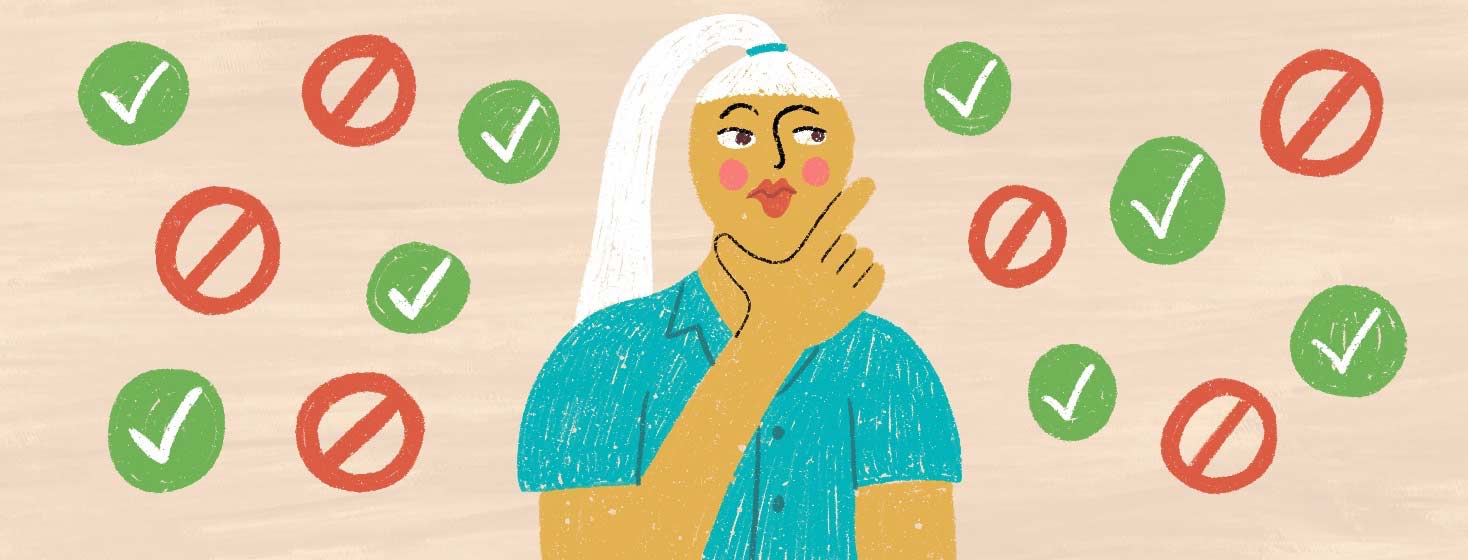How Fact-Checking Delusions Helps Me Manage Schizophrenia
For me, the biggest challenge of having schizophrenia is delusions, which manifest in my brain like fake memories of things that never happened.
They're typically triggered by meaningful conversations I end up thinking about for days after. Most people can probably relate to replaying an interaction over and over in their heads. The problem comes when I think about it so hard the seams of my real memories come apart and fake memories start rushing in.
Replaying memories over and over
Doctors usually tell us to "let it go" when we start thinking about our delusions, worrying that obsessing over our delusions will make them worse. But that's like telling someone with anxiety to stop worrying – it's just not that simple. Often, it’s impossible.
When I'm replaying memories over and over in my head trying to figure out if they're real, the single thing that has most helped me snap out of it has been fact-checking my memories. Once I compare what I remember with a trusted account, I'm able to finally move on and put my delusions aside.
Ruminating about delusions
Checking the facts about my delusions empowers me to cast aside memories I now understand never happened. I've wasted a lot of emotional energy trying to process events that never took place. Realizing the events in question were actually just delusions enables me to stop ruminating about them.
It's also helped me realize that a great deal I thought was delusions were actual, reality-based memories. It hurts when others dismiss my experiences as delusions. I've internalized this belief, which has often led me to doubt real memories. Realizing that I remember my psychotic episodes better than anyone thought has bolstered my self-esteem.
3 ways I fact-check my delusions
Fact-checking delusions can be scary, as you never know what you might find. But every time I've embarked on a fact-finding mission, it’s brought closure that has allowed me to stop spinning out over my delusions and move on with my life.
Here are 3 ways I fact-check my delusions:
1. Talking to witnesses
Try asking people who were there about what happened. This really helped when I was experiencing delusions after I filmed a television special about my schizophrenia journey.
Filming the special was a huge stressor, and stress can trigger delusions. Sure enough, in the days that followed the shoot, I found myself ruminating about what I said on camera, obsessively trying to remember every detail to the point that I started to remember things that never happened.
But I called a friend who participated in the shoot, and he told me that memories I had of him getting upset with me never happened, and that in reality he wasn't mad at me at all. Once I cleared that up, I was able to move on and put my delusions aside for good.
It's important to only employ this strategy with people you trust to be honest. It's a very vulnerable position to not be able to trust your own memories. Only fact-check with people who sincerely want to help you out and won't mislead you.
2. Online research
Identifying aspects of your memories easily verifiable by online research can also be really helpful. I employed this technique to determine how well I remembered my onset of schizoaffective disorder and the conversation I had right before entering psychosis for 10 months.
I went into psychosis at work at a nonprofit organization founded by the wife of the governor of California. Over the course of 10 months of psychosis, I experienced memories of the conversation I had with the organization's executive director that were all over the place. Some couldn't have possibly happened. Others, I wasn't so sure.
I had a memory of the executive director mentioning it was Inauguration Day. For years, I thought this, along with most everything I remembered about that conversation, was delusions. Three-and-a-half years went by before I summoned the courage to Google the day of the governor's inauguration.
But sure enough, it was January 7, 2019 – the day I went into psychosis. Realizing I could trust my memory of what happened better than anyone told me I could was tremendously empowering.
3. Medical or police records
If your psychotic episode culminated in an encounter with law enforcement or the healthcare system, your police or medical records may provide useful information for your fact-checking mission.
Everyone has the legal right to access their medical records, and anyone can request police reports. The steps for how to do this vary by jurisdiction, so I'd recommend doing some research into how to request your specific records. But I've found it's not too onerous or complicated of a process.
Medical records and police reports typically contain details and narratives of the encounters that can help determine what really happened. For example, during one psychiatric hospitalization, I couldn’t stop thinking about a conversation I’d remembered having with the doctor.
I remembered the doctor's name, so I requested my medical records to test how well my memories matched up with reality. Sure enough, the name I remembered was printed on my records. That helped me understand that I likely remembered the conversation better than I expected. Armed with this knowledge, I was able to stop questioning my memories and move on from the experience.
Navigating delusions with schizophrenia
Managing schizophrenia is hard, and there's no one-size-fits-all solution. While ignoring delusions may work for some, it has never worked for me. Fact-checking my delusions has been crucial. It gives me control over my brain, helps me understand my episodes better, and empowers me to realize that I remember my episodes better than anyone expects.
By actively investigating my delusions, I can navigate the confusing parts of my mind with more confidence. It's not an easy process, but it offers a way to feel more in control and less overwhelmed by my condition.

